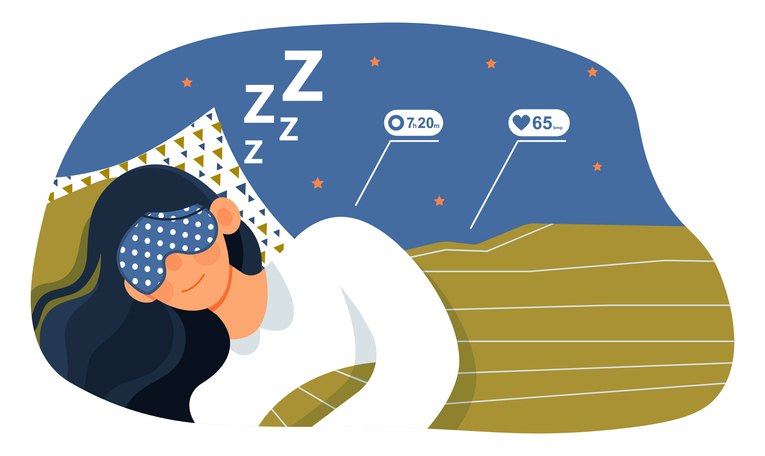
You’ve been trying to solve a sleep problem with willpower. Let’s switch to science.
My Sleep Plan: 8 Science-Backed Habits for Your Best Rest Ever
Ever found yourself staring at the ceiling at 3 AM, mentally calculating how many hours of sleep you might still get if you fall asleep right now? You're far from alone. Poor sleep affects millions, with the CDC reporting that one-third of U.S. adults regularly don't get enough sleep. Yet quality sleep remains one of the most powerful tools for mental clarity, emotional regulation, and physical health.
The good news? Small changes to your sleep habits can yield dramatic improvements in your rest. Let's explore the science of sleep hygiene—the practices and habits that set the stage for quality sleep—and discover how to transform your bedroom into a true sleep sanctuary.
Sleep hygiene refers to the behaviors, environmental factors, and habits that promote quality sleep. Just as dental hygiene prevents tooth decay, sleep hygiene prevents sleep dysfunction.
"Sleep is the foundation on which all other aspects of health rest," says Dr. Matthew Walker, neuroscientist and author of "Why We Sleep." Research consistently links quality sleep to improved immune function, better cognitive performance, reduced risk of depression, and even longer lifespans.
📈 According to a 2023 study published in the Journal of Sleep Research, consistent sleep hygiene practices can improve sleep quality by up to 42% in adults with mild to moderate sleep difficulties—without medication.
Our bodies constantly communicate with us about our sleep needs, but modern life makes these signals easy to miss or ignore.
Our bodies signal sleep needs through drooping eyelids, slowed reaction time, decreased body temperature, and subtle changes in posture and facial expressions. Recognizing these cues is crucial.
A fascinating 2022 study from the University of California found that people responding promptly to their first wave of evening drowsiness reported significantly better sleep quality.
1. 🕒 Maintain a Consistent Sleep Schedule
Going to bed and waking up at the same time daily—yes, even weekends—strengthens your circadian rhythm and improves sleep quality. Check out the sleep calculator.
2. 🌡️ Optimize Your Sleep Environment
Ideal bedroom temperature: 65-68°F (18-20°C). Reduce noise and light, remove work materials, use blackout curtains, and incorporate calming scents like lavender.
3. 📖 Develop a Wind-Down Ritual
30-60 minutes of calming activities before bed (reading, stretching, meditation, a warm bath, journaling) reduce the time it takes to fall asleep.
4. 🌞 Mind Your Light Exposure
30 minutes of morning sunlight improves sleep quality. Reduce evening screen time or use blue-light filters 60 minutes before bedtime.
5. 😴 Master the Strategic Nap
Ideal nap duration: 10-20 minutes between 1:00-3:00 PM enhances cognitive function without disrupting nighttime sleep.
6. ☕🍷 Manage Caffeine and Alcohol Wisely
Limit caffeine intake 8 hours before bed. Avoid alcohol close to bedtime as it reduces REM sleep and causes nighttime awakenings.
7. 🛋️ Transform Your Sleep Space
Clear clutter, use calming colors, dim lighting, and consider white noise to signal to your nervous system it's time for rest.
8. 🧘 Address the Racing Mind
Schedule "constructive worry time" early in the evening to reduce bedtime anxiety.
This is challenging - you don't have to do this on your own. ❤️❤️❤️
🛌 We Will Help You Transform Your Nights - Get A Personalized Sleep Plan ✨
Myth #1: You can "catch up" on sleep on weekends. Reality: Consistency is key.
Myth #2: Everyone needs 8 hours. Reality: Most adults need 7-9 hours; needs vary.
Myth #3: Stay in bed if you can't sleep. Reality: Get out of bed after 20 minutes and engage in relaxing activities.
✅ Consistency trumps perfection.
The Sleep Sanctuary: Quick Tips
Morning: 15-30 minutes of natural light exposure
Daytime: Stay active, limit naps to 20 minutes before 3 PM
Evening: Electronic sundown 60 minutes before bed
Bedtime: Keep your room cool, dark, and quiet
📅 Consistency: Same wake time every day
📵 Environment: Remove work and screens
Quality sleep isn't a luxury—it's essential for optimal physical, mental, and emotional health. By implementing these science-backed practices, you’re not just improving your nights—you’re transforming your days.
✨ What's one sleep habit you'll commit to changing this week?
The Ultimate Health Multiplier
Improving your sleep is not just another wellness fad; it's the ultimate health multiplier, positively impacting every facet of your well-being. So tonight, instead of seeing sleep as lost time, embrace it as the foundation that makes everything else in your life better.
Your future self—energized, balanced, healthier, and creatively inspired—will surely thank you.